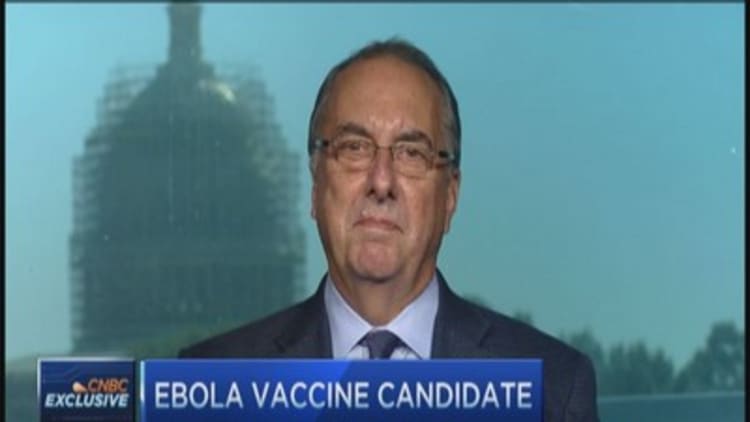
A 5-year-old boy hospitalized in New York City has tested negative for the deadly Ebola virus, officials announced Monday afternoon.
The unidentified young boy had arrived in the city from the West African nation of Guinea on Friday. After showing signs of being ill Sunday in a Bronx apartment, he was rushed to Bellevue Hospital in Manhattan by emergency medical workers wearing hazardous materials protective suits.
Bellevue is the same hospital where a Manhattan physician who recently returned from Guinea is being kept in isolation after testing positive for Ebola.
On Monday morning, the five-year-old began running a fever and was tested for Ebola.
Read MoreNew test can spot Ebola in 30 minutes: Report
"The result of the test is negative," the city health department and the New York City Health and Hospitals Corp. said in a prepared statement issued hours later.
"Out of an abundance of caution, further negative Ebola tests are required on subsequent days to ensure that the patient is cleared."
"The patient will also be tested for common respiratory viruses," the statement said. "The patient will remain in isolation until all test results have returned."
The test result was announced hours after federal officials announced new guidelines on Ebola monitoring in the U.S. and amid growing debate over whether health-care workers should be subject to mandatory, 21-day quarantines after returning to the U.S. from treating Ebola victims in West Africa.
Worldwide, there have been more than 4,900 deaths from Ebola, and another nearly 5,700 confirmed cases of the virus, making it the worst outbreak by far since the virus was first discovered in the mid-1970s.
The guidelines issued Monday by the Centers for Disease Control establish four different "risk" categories for people entering the United States from West Africa, and lay out recommendations for how those people should be monitored for signs of the often deadly virus.
The guidelines do not have the force of law, but CDC's recommendations often are closely followed by state and local health authorities.
Read MoreNurse tests negative for Ebola in NJ, discharged
The guideline's highlights include calling for "voluntary isolation" for 21 days for people who are at high risk of contracting Ebola because of a needle stick or the use of inadequate protective gear while treating patients in the countries of Sierra Leone, Guinea or Liberia. The guidelines also call for active, daily, in-person health monitoring of those people, as well as others at "some" risk who treated Ebola victims without a breach in protective measures.
The CDC said high-risk returning health-care workers should not travel on public transportation or participate in activities with others until they clear a 21-day incubation period for Ebola. Frieden said, however, that "jogging in the park" would not be discouraged by the guidelines.
CDC said a "case-by-case" assessment should be made on whether to restrict movements and public activities for people at at "some" risk.
People at "low" risk, who have spent time in Ebola-afflicted countries, he said, should at least monitor their temperatures daily and report that via the phone to local health authorities, the CDC recommended Monday.
The fourth and final risk category introduced by CDC on Monday was "no risk," and applies to travelers who either have spent no time in West Africa, or who have been out of that region for longer than the 21-day incubation period. Those people require no monitoring, or limits on travel or public activities, CDC said.
Nearly 5,000 people have died in the three West African countries from Ebola, and another 5,000 were infected with the disease in the current outbreak, the worst by far on record in four decades.
Since Oct. 11, when the U.S. began monitoring temperatures of people arriving from West Africa on airplanes, there have been 46 health-care workers who had some level of risk under the new guidelines, said Dr. Tom Frieden, director of the CDC.
One of them, Dr. Craig Spencer, cleared screening at JFK Airport in New York City on Oct. 17, but developed a fever and tested positive for Ebola last Thursday, the day he was taken to Bellevue by medical workers in Haz-Mat gear.
Although the CDC said it was urging "voluntary isolation' for high-risk people, Frieden acknowledged the guidelines accepted the authorities of state and local health departments to compel such isolation if someone in the high-risk category didn't comply with the recommendations.
The CDC's guidelines were issued three days after the governors of New Jersey and New York ignited a firestorm by ordering mandatory quarantines, at-home or otherwise, of health-care workers returning from treating Ebola victims in West Africa.
Governors Chris Christie and Andrew Cuomo have stood by those quarantines in the face of strong criticism for medical groups and pressure from the White House to reverse their policies. Among the concerns of opponents to the governors' policies is fear that it will discourage health workers from volunteering to fight the virus in West Africa.
The Infectious Diseases Society of America, in a statement said it "does not support mandatory involuntary quarantine of asymptomatic health-care workers returning from Ebola-affected areas. This approach carries unintended consequences without additional benefits."
In an editorial published Monday, New England Journal of Medicine wrote that the mandatory quarantine policies "is not scientifically based, is unfair and unwise, and will impede essential efforts to stop these awful outbreaks of Ebola disease at their source, which is the only satisfactory goal."
"The governors' action is like driving a carpet tack with a sledgehammer: it gets the job done but overall is more destructive than beneficial," the NEJM editors wrote.
Read MoreDrugmakers double down on Ebola vaccines, treatments
Hours before the new CDC guidelines were issued, a nurse who had been involuntarily quarantined in New Jersey since Friday was discharged from a Newark hospital and allowed to travel to Maine.
The nurse, Kaci Hickox, had complained of what she characterized as inhumane treatment from being isolated after becoming feverish on Friday night. She says she was kept hospitalized against her will even after her temperature returned to normal, and after she tested negative for Ebola.
The state of Virginia on Monday morning said will now require health care workers who have cared for Ebola patients in West Africa to sign an agreement to be monitored daily by visits from medical workers, who will take their temperatures for 21 days. The state also said it will ask anyone else traveling from the three West African countries stricken with Ebola—Sierra Leone, Guinea and Liberia—to take and record their temperature at least twice per day for three weeks.
Should a traveler develop any worrisome symptoms, but an initial medical evaluation is negative, the traveler may be asked to remain at home for the remainder of the 21 days with close monitoring.
Virginia is not issuing a mandatory quarantine order, although the state noted it has the right to do so.
Debate over the value of quarantines and possible travel bans from West Africa has grown in the past week, after the New York City physician, Spencer, tested positive for Ebola, which he is believed to have contracted while working in Guinea with the aid group Doctors Without Borders.

Spencer is being treated in isolation at Bellevue Hospital, where the five-year-old boy was tested for the virus Monday. Spencer was listed in serious, but stable condition.
Spencer's fiancee is in quarantine in a Manhattan apartment.
In a statement released Monday afternoon, a spokesman for United Nations Secretary-General Ban Ki-Moon said, "The Secretary-General is concerned by the recent restrictions put in place in several countries and localities applying to people who have travelled to the main Ebola-affected countries.
"He believes that these restrictions have put particular pressure on health-care workers and those who have been on the front line of the Ebola response," Ban's spokesman said. "Returning health workers are exceptional people who are giving of themselves for humanity. They should not be subjected to restrictions that are not based on science. Those who develop infections should be supported, not stigmatized."
Read MoreChristie's passionate Twitter defense of quarantine
"The Secretary-General reiterates that the best way for any country to protect itself from Ebola is to stop the outbreak at its source in West Africa. This requires considerable international health care worker support and in return for this support, we have an obligation to look after them. "


